Fantasia 2019, Day 10, Part 4: 8
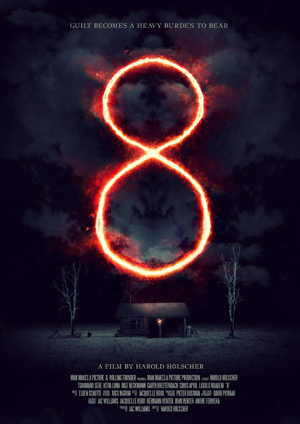 My last movie of July 20 was a horror film from South Africa. Written and directed by Harold Holscher, 8 has elements of the classical ghost story embedded in a larger tale of folklore and tragedy. It’s a period tale, set in 1977, and is set in a farm named Hemel op Aarde: Heaven on Earth.
My last movie of July 20 was a horror film from South Africa. Written and directed by Harold Holscher, 8 has elements of the classical ghost story embedded in a larger tale of folklore and tragedy. It’s a period tale, set in 1977, and is set in a farm named Hemel op Aarde: Heaven on Earth.
Not long after the start of the film the run-down farm’s inherited by a man named William (Garth Breytenbach), a failed businessman who wants to start over there along with his wife Sarah (Inge Beckmann) and niece Mary (Keita Luna). Mary, who came to live with William and Sarah after the death of her parents, is happy to come to the farm; she’s an inquisitive girl deeply interested in all manner of subjects, including African myth and insects. Sarah doesn’t care for these things, or for having to live far from the big city. William’s difficulty in getting the electricity running at the farm doesn’t help. Luckily, the White family is given a hand by an older Black man named Lazarus (Tshamano Sebe). William’s soon relying on Lazarus for all sorts of things, despite Sarah’s distrust. And despite the distrust of a nearby village of Black people, who know and despise Lazarus, and who have no use for William, either. Is Lazarus hiding a dark secret?
In fact, we know from the opening shots of the movie that he is. And as 8 goes on that mystery is unveiled; unveiled almost too completely for the film to stay a horror story, in fact. There’s an honesty and directness to the film that’s unusual in horror. There are few jump scares, and few horrific twists. Instead there’s an ultimately character-based story that comes close to being a kind of tragedy. You know why people act the way they do, and what Lazarus wants. You understand the price he has to pay for his actions. And you have sympathy for everyone involved.
It’s oddly colourful for a horror movie, too, rich and shadowed, but not afraid of the bright light of the sun. I found approaching it as a horror film left me wrong-footed; the farmhouse, which seems like a spooky haunted house in the early scenes of the movie, becomes less important narratively and thematically as the story goes on. If the usual haunted house seems to have something to say about (for example) class or power or history or the personality that dwells within it, Heaven on Earth comes to have less and less meaning, as the focus of the story increasingly moves away from the main building. What might have been an icon of colonial power is instead just a place where things happen.
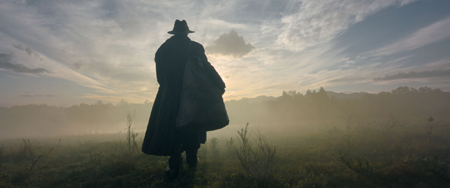 This is in part because the film is fundamentally Lazarus’ story, anchored by Sebe’s performance. And beyond Lazarus himself, 8 is the story of his interaction with the village, led by the aged Obara (Chris April). It’s not that William and his family have no relevance; Lazarus and Mary strike up a deep friendship that sets up the end of the movie and some of Lazarus’ last choices. But they’re ultimately minor characters in another family’s drama.
This is in part because the film is fundamentally Lazarus’ story, anchored by Sebe’s performance. And beyond Lazarus himself, 8 is the story of his interaction with the village, led by the aged Obara (Chris April). It’s not that William and his family have no relevance; Lazarus and Mary strike up a deep friendship that sets up the end of the movie and some of Lazarus’ last choices. But they’re ultimately minor characters in another family’s drama.
Which is not to say that they’re underwritten. In fact all the characters in this movie are intensely realised, with clear motivations. Sarah, for example, can’t have children of her own and so resents Mary. William’s trying to make up for his failure in business and to be a provider for his family. But these motivations are different in kind from the motivations of Lazarus, which are more mythic and fantastic. By extension so are those of Obara and the other villagers, as they work against Lazarus. William’s family becomes our way in to their story, in a sense; it feels significant that we first see them on the road to Heaven on Earth, as we follow them a little ways on their journey. They are moving from the known city to the more liminal space beyond. And they take us with them.
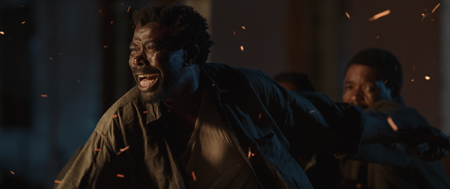 What is certainly important is that they, and the movie, go some very strange places. By the end of the film there’s a glimpse of a fantasy otherworld; seen more than edge-on, as would be usual a horror story, and definitely a real aspect of the film’s universe. The movie builds up to this point step by step, in the tradition of both horror and fantasy, building slowly through foreshadowing and increasingly lingering glimpses of the supernatural. Obara and his people are useful in this movement to another level of story. Their involvement means the story stops being that of a family struggling against malign forces they don’t understand, and instead becomes the story of an old conflict based around rituals and powers with rules which adepts can manipulate.
What is certainly important is that they, and the movie, go some very strange places. By the end of the film there’s a glimpse of a fantasy otherworld; seen more than edge-on, as would be usual a horror story, and definitely a real aspect of the film’s universe. The movie builds up to this point step by step, in the tradition of both horror and fantasy, building slowly through foreshadowing and increasingly lingering glimpses of the supernatural. Obara and his people are useful in this movement to another level of story. Their involvement means the story stops being that of a family struggling against malign forces they don’t understand, and instead becomes the story of an old conflict based around rituals and powers with rules which adepts can manipulate.
This isn’t to say that the movie becomes the story of a wizard’s battle. But at the very end it becomes something close, if only because of Tshamano Sebe’s powerful work humanising Lazarus. The climax is very strong, visually reaching another level, but also thematically tying together a number of threads. We see here how the title works, not as a number but as a sign of the infinite; that could have been a trite misstep, but the way the story handles the idea makes it resonant.
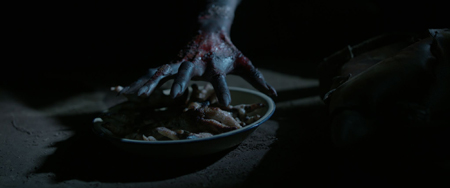 I’ve heard and read criticism of 8 as too mainstream and Hollywood-like. That strikes me as an odd criticism for a film so rooted in a specific place and milieu (though I admit I’m not knowledgeable about South Africa in 1977, so perhaps I’m missing something there). It is true that the movie looks and sounds very polished, but the problem with Hollywood horror is not polish, to my mind. The problem is whether the gloss hides an empty core. On that score, 8 has nothing to worry about. This movie has a lot on its mind, if not always at the front of it. It has a very strong story to tell, filled with folkloric concepts. It’s fair to wonder whether it is, in the end, the horror story promised by its opening scenes (and its marketing). Personally I don’t see that it matters. 8 is a satisfying story told well. It may technically be better thought of as ‘dark fantasy’ rather than ‘horror,’ or perhaps ‘supernatural tragedy,’ if that genre exists. But all that means is that this is the wrong place to go for extreme amounts of gore. This is a story about transgressions made by the living against the dead, with occasional disturbing imagery. You can call it what you want. It works.
I’ve heard and read criticism of 8 as too mainstream and Hollywood-like. That strikes me as an odd criticism for a film so rooted in a specific place and milieu (though I admit I’m not knowledgeable about South Africa in 1977, so perhaps I’m missing something there). It is true that the movie looks and sounds very polished, but the problem with Hollywood horror is not polish, to my mind. The problem is whether the gloss hides an empty core. On that score, 8 has nothing to worry about. This movie has a lot on its mind, if not always at the front of it. It has a very strong story to tell, filled with folkloric concepts. It’s fair to wonder whether it is, in the end, the horror story promised by its opening scenes (and its marketing). Personally I don’t see that it matters. 8 is a satisfying story told well. It may technically be better thought of as ‘dark fantasy’ rather than ‘horror,’ or perhaps ‘supernatural tragedy,’ if that genre exists. But all that means is that this is the wrong place to go for extreme amounts of gore. This is a story about transgressions made by the living against the dead, with occasional disturbing imagery. You can call it what you want. It works.
After the movie director Harold Holscher took questions (and I took notes of what he said, as usual in unreliable handwriting). The first was about the process of making the movie, his first feature film. He said he wrote a first draft in 2008 and filmed the movie in 2014. It was tricky to get financing, he recalled, and said he put money for the film together with friends and family. He noted that some of the people in the film he’s known for over 20 years, and went to school with.
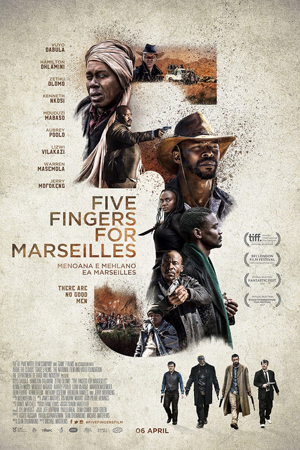 Asked about the folklore in the film, Holscher spoke about a friend of his who died in a car accident, and about this leading him to explore traditions beyond Western Christianity. He found one Zulu belief about healers, or sangomas, who can act to intercede if a soul gets lost after death, and this led him to wonder what might happen if a collector of souls were to take that soul for themselves.
Asked about the folklore in the film, Holscher spoke about a friend of his who died in a car accident, and about this leading him to explore traditions beyond Western Christianity. He found one Zulu belief about healers, or sangomas, who can act to intercede if a soul gets lost after death, and this led him to wonder what might happen if a collector of souls were to take that soul for themselves.
Asked about Tshamano Sebe, who plays Lazarus, Holscher said he’s an amazing man and amazing actor. He said he looked for a long time to find the right actor for the role before a friend discovered him on the set of a TV show called Black Sails. The next question was about how he found the balance in fusing gothic Victorian ideas and African elements; he said it was tricky, and that as a South African film it was difficult not to make it too overtly political. He wanted it to be familiar to Western audiences in some ways, and set it in 1977 as a nod to some of his favourite horror films of that general era, such as The Shining and Rosemary’s Baby, which in turn were referred to in the production design. He hoped this would generate a nostalgic sense that could be recognised even by non-African and non–South African audiences. He wanted to juxtapose a certain kind of prettiness with the horror.
He was asked about the theme of guilt in the movie, and acknowledged that was at the core of the film, particularly in the character of Lazarus. He said everyone feels guilty about something, and hoped the arc of the characters reflected that universal theme. To a question about Lazarus’ daughter, and how the performance brought out how she was both victim and monster, Holscher said the actress is a ballerina, and that he’d wanted a theatre person who had that kind of physicality; he spoke about her focus and professionalism. He recalled wanting to keep Keita Luna, who played Mary, away from the overt horror elements, and how the two girls ended up together in full make-up playing patty-cake and hide-and-seek anyway.
Asked about distribution, he said that at that time the movie as yet had no North American distribution deal. He said that he expected even South Africa would be a tricky audience, and hopes it does well overseas; he spoke about wanting to overcome cultural barriers and getting everyone into a theatre to enjoy a scary movie. Asked then about problems for genre film in South Africa, he said that prices to see a movie in a theatre are as high there as in North America while the average income is lower. He noted that even last year’s widely-praised 5 Fingers for Marseilles had only a limited release. Understanding where to place films was trickier, and it was generally more difficult to get people into theatres.
Asked about some of the ambiguities in a late scene in the movie, he spoke about the possibility of redemption for the characters. Then, lastly, asked about his upcoming plans, he said he had developed a number of ideas, and that this film just scratches the surface of questions he has about storytelling. He hopes it opens doors, observing it’s very hard to make films.
That ended the long day for me. Tomorrow held what looked to be an even stranger set of films.
Find the rest of my Fantasia coverage from this and previous years here!
Matthew David Surridge is the author of “The Word of Azrael,” from Black Gate 14. You can buy collections of his essays on fantasy novels here and here. His Patreon, hosting a short fiction project based around the lore within a Victorian Book of Days, is here. You can find him on Facebook, or follow his Twitter account, Fell_Gard.
Hey guy — definitely not a “horror” movie; “Supernatural Tragedy” fits the bill nicely (good term, by the way). It’s not heavy tragedy, so perhaps “melodrama”? Regardless the term, it was as good as you describe it to be. I just about popped inside when the titular imagery burst forth.
Here is a link…
https://366weirdmovies.com/interview-with-8-2019-director-harold-holscher/
…that leads to my interview with the director. I did not, unfortunately, the Q&A, but he addresses a lot of the same issues.
See you ’round the Comments.
Excellent interview! ‘Melodrama’ could work, but to me it kinda implies a plotty and emotionally extravagant movie that’s pretty different from this one. Probably a good sign for the movie that it doesn’t fit neatly into a single standard term.